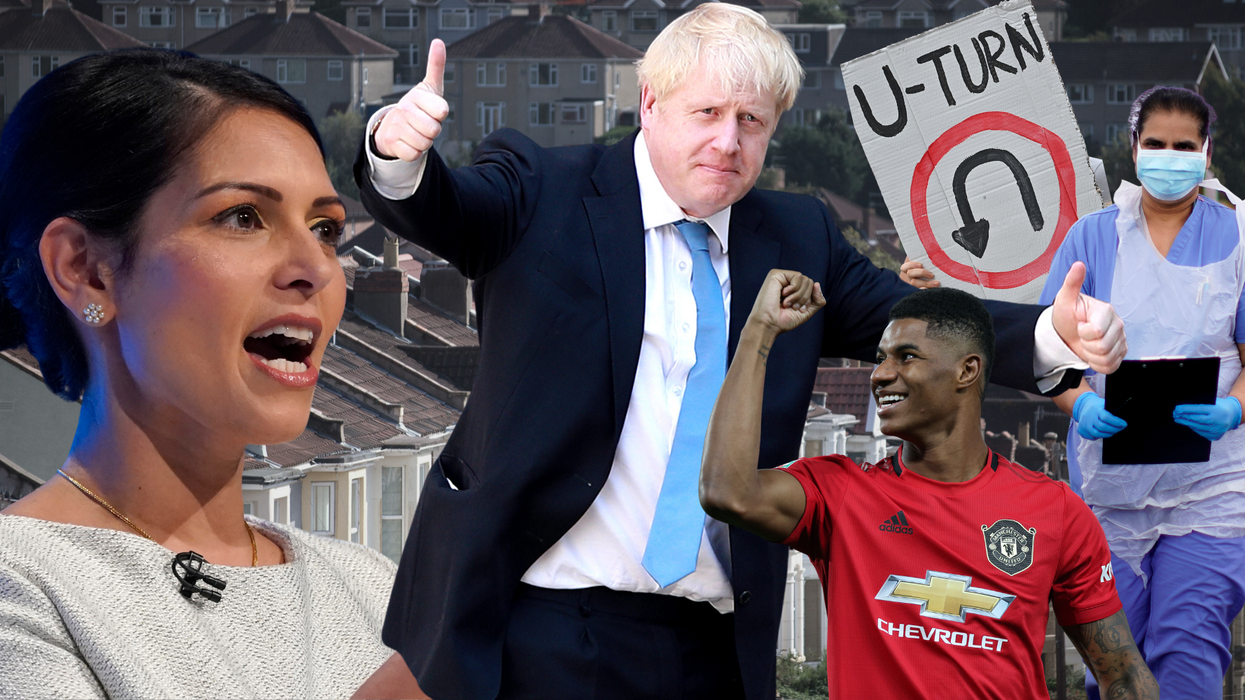Moya Lothian-McLean
Aug 24, 2020

Getty
Boris Johnson promised 2020 would be a “fantastic year” for the UK.
Things obviously didn’t quite go to plan and for the newly minted Tory majority government, it has not been smooth sailing.
Lockdown has offered an unusual opportunity for scrutiny by the public; where decisions that may have previously flown under the radar, are being paid attention too.
It’s led to a summer that will be remembered more for its screeching U-turns than its scorching weather. As autumn approaches, it’s time to do a quick retrospective on the top hits of the silly season.
Here’s seven of the biggest government U-turns during the pandemic.
1. Free school meals
How many millennia ago does this feel? Remember when Boris Johnson was ready to scrap the meagre £15 meal summer voucher allowance given to low-income families who normally receive free school meals? In the middle of a pandemic? When people were losing their jobs and children were being forced to stay home from school? Yes, that.
That was until a last-minute intervention from footballer Marcus Rashford, who recalled his own dependence on the scheme and begged MPs not to put further pressure on disadvantaged families. At first, they rejected his plea.
But as the campaign gained traction, Johnson eventually caved, announcing the voucher scheme would continue on 16 June. The prime minister also, remarkably, claimed he hadn’t been “aware” of the footballer’s attempts to reverse the decision.
2. Track and trace
Recall Britain’s “world-beating” coronavirus tracing system? That was supposed to be in place by June? And was centred entirely around an app that was supposed to trace people who’d been in contact with coronavirus patients?
The first U-turn came in June when the government was forced to scrap a “custom-made” tracing app and instead use technology from Google and Apple.
The second U-turn arrived swiftly afterward; suddenly the app was no longer the centre of the track-and-trace programme, but a bonus item that Lord Bethell, minister of innovation, admitted may not even be ready until winter.
And even then it might not work. Silicon Valley, this is not.
3. NHS leave to remain
In the midst of the pandemic, the government announced a new scheme to ‘reward’ the families of NHS staff who died of coronavirus.
If they were migrants, their dependents would be offered indefinite leave to remain in the UK, free of charge.
However, there was an immediate glaring inequity: the scheme was initially only open to doctors and nurses, leaving out the thousands of workers in lower-paid but vitally essential jobs with the NHS, like cleaners.
The decision was dubbed “outrageous” and “heartless”, with NHS England medical director Stephen Powis giving an “impassioned tribute” to the contributions made by non-medical support staff at the daily briefing.
This led to a swift U-turn by home secretary Priti Patel, who issued a statement on 20 May announcing the scheme would be extended to NHS support staff and social workers.
4. Eviction ban
As new data revealed that at least 20,000 households had been made ‘legally homeless’ during the pandemic, despite a ban on evictions, there were further calls to extend the prohibition on turfing out tenants from privately rented properties that were introduced in March.
The government waited right up until the last minute – the ban on evicting tenants was due to the end on 23 August.
But in a U-turn, it’s now set to finish on 20 September, although campaigners are asking for the government to follow the example of Scotland, who have placed a ban on evictions until March 2021.
It makes sense…
5. NHS surcharge for migrant workers
For those familiar with it, the surcharge migrants were forced to pay in order to gain access to NHS services was a huge bone of contention.
And during the pandemic, the surcharge came under renewed scrutiny as the public began to ask why NHS staff were being lauded for their life-saving work, while simultaneously having to pay around £400 a year to use the service.
Even Jeremy Hunt, the man who introduced the fee in 2015, said it should be scrapped. At first, Priti Patel said the policy was “under review”. It was later revealed that this was “cancelled”.
But pushback and publicity meant that one month after cancelling the review, Patel tweeted that she and health secretary Matt Hancock would, in fact, be removing NHS and care workers from being subject to it.
Good.
6. Remote voting for MPs
In May, Jacob Rees-Mogg announced that MPs would be required to attend parliamentary votes in person or lose their vote altogether.
It was part of a push for the government to lead by example as they attempted to drive people back to work.
However, a cross-party cohort of MPs fought back against the attempt to remove the virtual voting system they’d been using since the beginning of lockdown.
Funnily enough, many who were at high-risk from coronavirus did not appreciate being told they had to potentially expose themselves to a deadly illness or face losing their right to vote.
Ditto those who were caring for relatives in similar situations. In fact, it was seen as full-blown discrimination. Which is why Boris Johnson backtracked on 3 June, announcing proxy voting would be available to those who needed it.
Predictable.
7. A-Levels
The crowning glory of a summer of backpedalling. After seeing the fiasco that was the Scottish Highers thanks to use of a similar predictive system, you’d think that the government would have been more prepared for the chaos that arrived on A-Level results day.
But no. It quickly emerged that almost 40 per cent of students had been downgraded by the algorithm employed in lieu of actual examinations being stymied by coronavirus. Also, individual students at schools that had historically performed more poorly overall saw their marks pulled down by the system, which couldn’t conceive of them bucking the trend.
It was a mess that threatened an entire generation’s future. Stories of devastated young people and parents flooded the media. As soon as education secretary Gavin Williamson emerged to utter those fateful words – that there would be “no U-turn, no change” – the clock was ticking.
Two days later, the screeching U-turn arrived: students could revert to their teacher predicted grades, or their mock exam results if they were higher.
Of course, this posed a whole new problem for university admissions departments, who’d already rejected thousands and given out places.
Maybe we’ll get some more U-turns out of this one yet...
Top 100
The Conversation (0)













